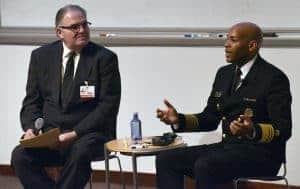U.S. Surgeon General Emphasizes Partnerships for Health
| April 16, 2017 | To be better partners, we must create better relationships, said Vice Admiral Jerome M. Adams, M.D., M.P.H., 20th U.S. surgeon general on April 12 during a visit to UAMS.
He spoke about many different health topics such as the opioid crisis, medical marijuana, and access to care, but the overall theme was a reflection of his motto as surgeon general, “Better Health through Better Partnerships.”

Vice Admiral Adams (right) responds to questions during “fire-side” chat alongside Kevin Ryan, J.D., who moderated the event.
Adams, who had multiple speaking engagements while in Arkansas last week, was at UAMS to have a “fire-side” chat with UAMS faculty, staff, and students. After a brief moderated question-and-answer session, he welcomed questions from the audience.
“We must be better at recognizing who our audience is and speak in a way that it will resonate with them,” said Adams.
As surgeon general, Adams is committed to maintaining strong relationships with the public health community and forging new partnerships with non-traditional partners.
Recently Adams issued a public health advisory that urges more Americans to carry naloxone, a lifesaving medication that can reverse the effects of an opioid overdose.
He said anyone should be able to recognize the signs and symptoms of an opioid overdose and then demonstrated to the audience how to administer naloxone.
“Anyone can save a life with naloxone,” Adams said.
He said the opioid problem is not a problem with the individual, but the system as a whole.
“We must have good treatment, recovery, housing, food, jobs, and be able to give hope to people that they will be successful in their recovery,” Adams said. “It’s not just about giving them the lifesaving drug.”
He talked about the importance of prevention and talking to kids about the dangers associated with opioids.
“We need to provide an environment where kids recognize the positives and negatives of a high and the differences in a natural high versus an opioid or other addiction high,” Adams said.
In reference to medical marijuana, Adams said, “We need to look at it the way we do any medication and determine the good from the bad.”
States that are seeing a rise in medical marijuana prescriptions are seeing a reduction in opioid prescriptions.
“This is a system failure,” Adams said. “We are not properly treating chronic pain and we need to get to the root of that problem.”
A member of the audience asked about access to care and how to fix that problem.
“Folks need to have access to care, but the question is how we can get there together,” Adams said. “Conversations need to happen. If we want people to buy what we are selling, we must be willing to go to them and let them know that they can be a part of the conversation.”

Sarah Beckwith, first-year medical student, asks question at “fire-side” chat with U.S. Surgeon General.
Adams offered recommendations for students, who are “the now” and not “the future” of health care. He advised them to get involved by writing a letter to the editor, showing up at a community meeting, or contacting a state health officer. He discussed the importance of being an effective communicator.
Adams ended the chat by offering what he hopes for his legacy as surgeon general.
“I want to be able to transform health messages to an economic message,” said Adams. “And I want the focus of health care to be on community health and physical wellness, rather than a focus on specific diseases.”
As surgeon general, Adams oversees the operations of the U.S. Public Health Service Commissioned Corps, which has about 6,700 uniformed health officers who serve to promote, protect and advance the health and safety of the nation.
